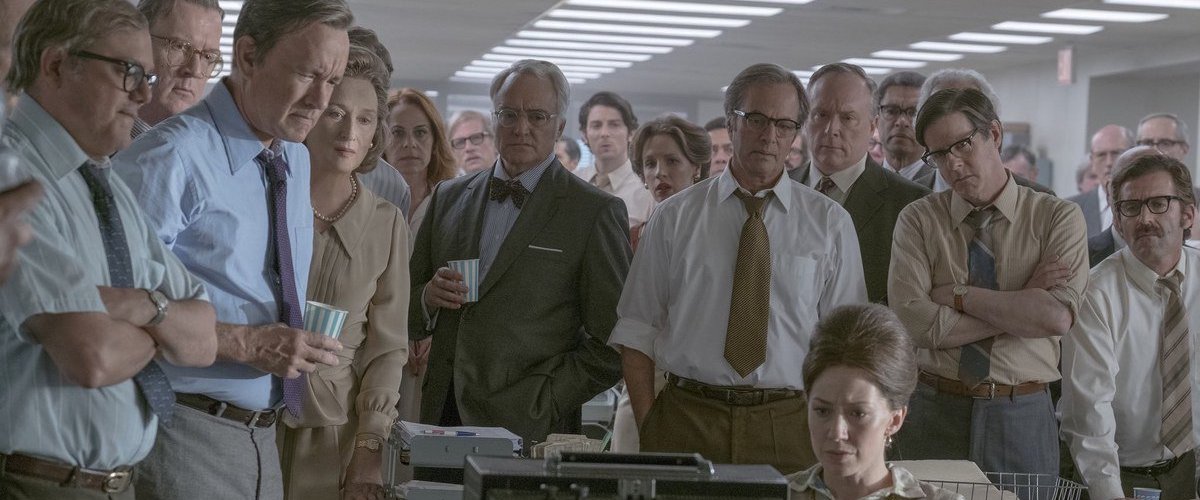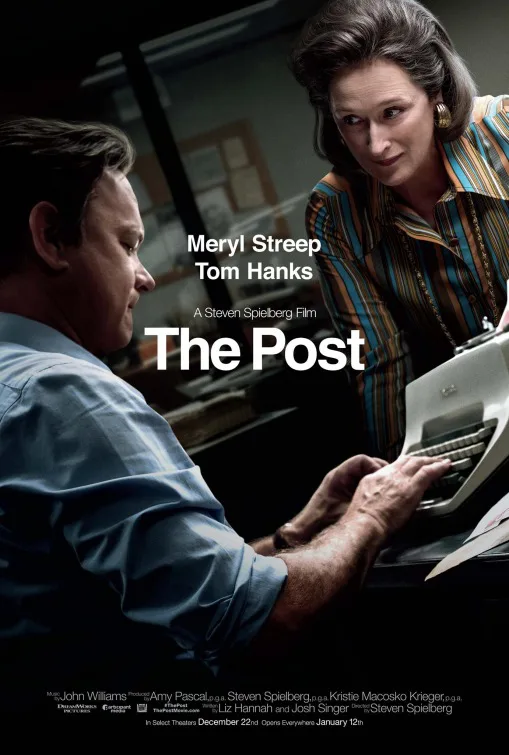“We have to be the check on their power. We don’t hold them accountable, my God, who will?” Steven Spielberg’s “The Post,” rushed into production on a turnaround time that only Ridley Scott could possibly match, may be the story of a challenge to the free press in 1971 but lines like that solidify how much it’s intended to also be read as a mirror of 2017. As the President of the United States challenges different journalistic institutions, mostly through his Twitter feed, and “truth” seems to have become a looser term than ever before, “The Post” is designed to be viewed as a commentary on today as much as yesterday, maybe even more. It’s fascinating to consider a film this well-constructed and packed with talented performers that would have played completely differently just two years ago. However, I wonder if hurrying the movie to strike a moment was the right decision. It’s a film that often calls attention to its own self-importance and falters when compared to Spielberg’s best historical dramas like “Munich” and “Lincoln,” movies that earn their messages instead of just stating them. One can almost see the weight on its shoulders to “say something important,” and it sometimes drags down the entire venture. However, there’s more than enough to like here, including a great ensemble, the best performance from a living legend in years, and, again, a message that feels depressingly timely.
“The Post” tells the story of the Pentagon Papers, choosing to focus on two key players in the unfolding battle between the free press and a White House that struggled to keep the secrets of how our government handled the Vietnam War under wraps. As Fritz Beebe (Tracy Letts, continuing his amazing 2017) says at one point, this was the first time that the court system of our government basically tried to stop the function of the free press.
It started when Daniel Ellsberg (Matthew Rhys) walked away with thousands of pages on the history of Vietnam, including sensitive and confidential information that revealed the lies the government had told the American people for years. To sum it up superficially with a line from the movie, “McNamara knew we couldn’t win in ’65.” Six years later, with thousands of deaths on their hands, the truth was revealed, first in the New York Times. The courts ruled that the Times couldn’t publish any more of the documents or what they learned from them, but the Washington Post found their way into the story as well with Ben Bagdikian (Bob Odenkirk) getting to the same source as his competition. Suddenly, the Post was sitting on hundreds of pages of sensitive documents that the courts had ruled couldn’t be published. If they ran a story, not only could they go out of business, they could literally be arrested for treason. What would you do?
The two central figures of this story are Kay Graham (Meryl Streep), the beleaguered publisher of the Post, doing a good job that too many men around her consider her incapable of doing, and Ben Bradlee (Tom Hanks), the editor of the Post, and the man who never questions whether of not they should publish. In casting alone, Spielberg makes clear his opinion of Graham and Bradlee, filling their shoes with two of the most beloved actors of all time. And they both deliver for their director, particularly Streep, who hasn’t given a performance this nuanced in a very long time—reminding one what she can do when she’s paired with the right collaborator (my biggest problem with Streep’s ‘00s and ‘10s work is how rarely she works with directors who challenge her). Hanks finds the right degree of gravity for Bradlee as well, although both occasionally slip up due to a script that too often calls attention to itself. This story should be about Graham’s fear that she may make the wrong decision—for her business or for the state of journalism as a whole—but the stakes don’t always feel right. We never really question what anyone is going to do in “The Post,” especially given how well-reported this story has been. (Although even if you know none of this story, there’s a distinct lack of suspense.) And to make up for that lack of actual tension, co-writers Liz Hannah and Josh Singer sprinkle in heavy doses of the kind of things people only say in movies (“Jefferson just rolled over in his grave,” for example). I often wanted a more tactile, dirtier version of “The Post,” one that didn’t feel like it was taking place in a Hollywood vacuum. Bob Odenkirk almost steals the movie just by seeming the least like a mouthpiece.
However, the truth is that every time “The Post” threatens to slide into pure, pretentious melodrama, the talent of someone involved pulls it out. Whether it’s a subtle choice made by Streep or Hanks, an economy of storytelling displayed by Spielberg, a composition by John Williams—there’s always something to hold on to in “The Post” that keeps it working. Even the sound design—a symphony of typewriter clicking and ringing phones singing out through the Post offices—is engaging. It’s a movie from one of our most essential filmmakers when it comes to pure entertainment, and it works on that level. Even just the parade of familiar faces (I didn’t even mention the always-welcome presences of Carrie Coon, David Cross, Sarah Paulson, or Pat Healy) will keep you engaged.
Will that engagement continue after the journalistic tumult of the Trump administration? If we’ve learned anything, it’s that challenges to the free press will always persist, and so there are almost certainly lessons for future generations in “The Post.” Will it hold up as cinema outside of its cultural moment? On the one hand, it doesn’t really matter. Despite what people want to argue in comments sections, film doesn’t exist in a vacuum, it often responds to and plays differently because of current events. And so while I’m curious to see how people remember “The Post” in ten years, we can only respond to it today, as institutions like the newspaper at its center are yet again under attack. Where are the Kay Grahams and Ben Bradlees of today? While I wish “The Post” asked this question more directly and angrily, there’s definite value in people this prominent asking it at all.




















